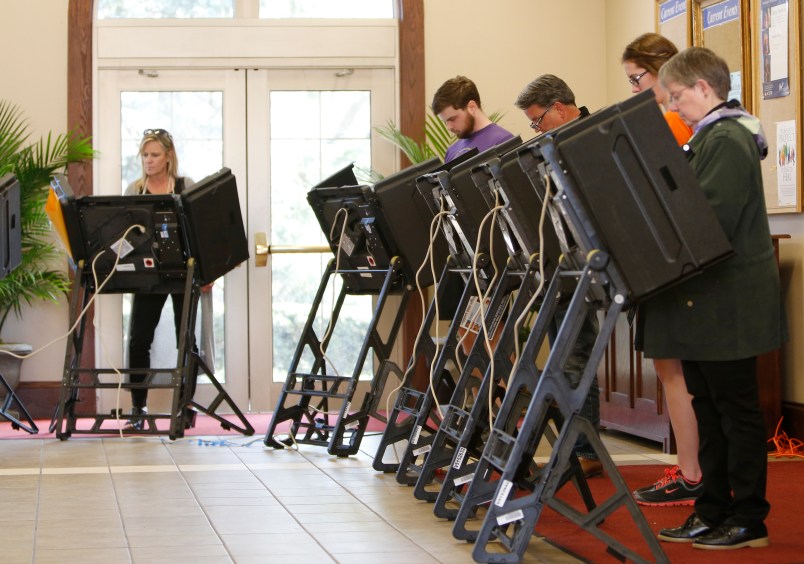Voting rights groups filed a federal lawsuit Wednesday challenging what they described as a massive voter purge in Ohio. The lawsuit accuses the state of violating the National Voter Registration Act of 1993 — also known as the “Motor Voter” law — by taking tens of thousand of voters off the registration rolls because they did not participate in past elections.
“As a result of these violations, numerous Ohioans have been disenfranchised in recent elections, and many more face the threat of disenfranchisement in the 2016 Presidential Election and future elections,” the complaint said.
The lawsuit is being brought by the progressive public policy organization Demos and the American Civil Liberties Union of Ohio, who are representing a state chapter of the A. Philip Randolph Institute, an African-American labor group, and the Northeast Ohio Coalition for the Homeless. It was filed in U.S. District Court in the Southern District of Ohio.
According to the complaint, Ohio operates two separate systems for removing voters from its registration rolls. The first, the “National Change of Address” Process, removes voters based on change of addresses filed with the U.S. Postal Service. While the complaint alleges some flaws in how Ohio is conducting that process, the lawsuit mainly focuses on what it is known as the Supplemental Process, which kicks in when a voter doesn’t vote in a series of elections.
Under that system, Ohio removes from the rolls any voter who does not participate in three federal elections in a row. The state sends voters who sit out those elections a notice requesting they confirm that they are still eligible to vote in the jurisdiction in which they registered.
However, the lawsuit alleges that the form, which is also used in the “National Change of Address” Process, is confusing. Among other things, the complaint says that the form requires the voters to provide basically all the same information needed to initially register. It also requires voters to provide proof of identity to remain registered, which is not mandated by the NVRA or Ohio law for a voter’s initial registration. It also does not tell voters that they can re-register online, nor does it provide a due date for the confirmation, according to the complaint. The complaint also says the form fails to explicitly tell voters that they will be removed from the rolls if they don’t return it.
According to the complaint, the state began removing voters, many of them people of color or lower income, off the rolls based on their lack of participation in elections since the 2008 presidential election. In Cuyahoga County alone, the complaint said, some 40,000 voters were removed from the rolls in 2015 through the Supplemental Process, even though there was no evidence they had not moved to a new jurisdiction.
Many of these voters showed up for the November 2015 election only to find out they were no longer registered to vote, the complaint said, and thus were unable to participate in that election.
“On information and belief, this problem will be much worse in the
November 2016 General Election, when a much larger number of infrequent voters will likely return to the polls for the first time since 2008 and since the 2015 purges, only to find that they are no longer registered or able to participate in the election,” the complaint said.
Updated at 1:45 p.m. ET: Ohio Secretary of State Jon Husted released a statement in response to the suit defending his state’s procedures when it comes to maintaining registration rolls and said the state had cleaned up the rolls of deceased voters and duplicate registrations.
“Ohio manages its voter rolls in direct compliance of both federal and state laws, and is consistent with an agreement in this same federal court just 4 years ago,” Husted said in the statement. “This lawsuit is politically motivated, election-year politics, is a waste of taxpayer dollars and opens the door for voter fraud in Ohio.”
Read the full complaint below:







Republicans cannot win elections without cheating. A vast majority of them are the scum of the earth
We need election day registration everywhere. We purge non-voters in my state too, but then if they show up, they just get directed to the registration table. Of course, stopping eligible voters is the point in Ohio.
Not a problem. When asked to comment Governor Kasich said he will form a committee to investigate the claims right after the November elections. However, he will ask the court to issue a stay order stating “We’re not going to drop any voter purge litigation into the election-year cauldron. I’m certainly not going to let it happen to the good people of Ohio.”
As usual the Republican suppression activities sound OK on the surface. A voter might be dead or might have moved away if he hasn’t voted the last several elections. May as well remove him from the list. Of course, problems happen when the voter shows up expecting to vote in a presidential election ignorant that he has been removed from the roles. There are ways to handle this sort of thing fairly for all, but they cost money. The usual Republican strategy is to not pay for the remediation. Come election day, the voter shows up and is shocked to discover he can’t vote.
I’m trying to figure out how failure to purge voters who are neither dead nor moved to another jurisdiction could lead to voting fraud. All the scenarios I can think up make me laugh too much to type. Also, if you’re going to send a verification letterwith the intent of removing someone from the voting rolls if they don’t answer within a set time, what reason other than vote suppression could you have for not telling them that?
(It strikes me that Husted would also make a fine spokesthing for Mossack Fonseca.)